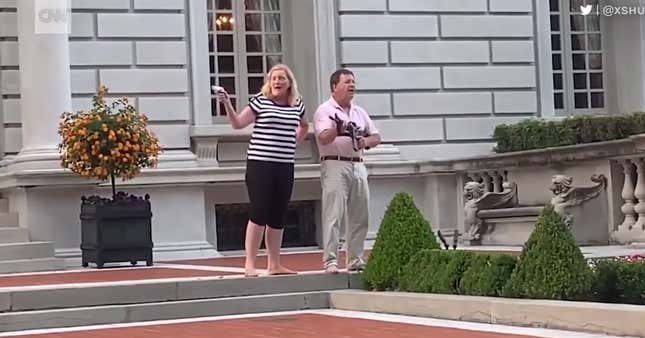
If the COVID-19 crisis hadn’t introduced zeitgeist-crashing terms like “coronavirus” and “social distancing” to our lexicon, “Karen” might have very well been the word of 2020. There have been explainers about it—one of which I wrote to distinguish it from “Becky.” There have been arguments over whether it’s racist (LOLOL) and misogynist (well...more on that in a bit). Washington Post global opinions editor Karen Attiah, who is Black—and, if you skimmed past that part, actually named “Karen”—wrote an essay on the ridiculousness of white women being upset by it, and the historical context of them using performative victimhood to endanger (and, sometimes, murder) Black people.
In America, white women are often believed and protected at all costs, even at the expense of Black lives. In 1955, it was a white woman who falsely accused 14-year-old Emmett Till of whistling at her in Mississippi, which led to him being brutally beaten and killed. Fast-forward to recent years and we still learn about black people being arrested or assaulted because a white woman called the police unnecessarily. Becky and Karen memes and jokes should be understood in this context, part of a long tradition to use humor to try to cope with the realities of white privilege and anti-Blackness.
Dehumanizing slurs don’t gain their cruel power overnight. They are part and parcel of generations of violence, erasure and discrimination. Calling the Karen meme the new n-word or asserting that it is a sexist slur only trivializes actual violence and discrimination that destroy lives and communities.
And, well, the “Karen Gone Wild” stories have been particularly fortuitous here, at VerySmartBrothas and at The Root. For instance, an all-caps essay I wrote on Amy Cooper, the “Darth Karen” who called the police on a Black birdwatcher in Central Park,” had over 500,000 page views and also remains the most fun I’ve had writing this year.
The benefits of using that term are obvious and aggressively seductive. It’s a reliable and immediately relatable shorthand for a type of white woman we all recognize, and some of us have had very personal and very dangerous interactions with them. And while the recognition of and conversations about this archetype ain’t new, the election of Donald Trump—and the revelation that 53% of white female voters voted for him (a number that, admittedly, has been in dispute)—was a massive exacerbator.
But that Karen has become so ubiquitous that it’s a reliable shorthand is the problem. What began as a term for the sort of obnoxious and entitled suburban soccer mom who demands to see your manager has become a catchall for all problematic white women, including those who are potentially murderous. (And sometimes actually murderous.) Of course, there’s considerable overlap here: an image of the coupon-wielding Karen and the pistol-wielding Karen together might just be the Spiderman meme. But giving women who do things that might actually kill you the same cutesy nickname as women who are just annoying as fuck just feels, I don’t know...weird and wrong. Like it’s memeifying death.
Also...hmm. The role of white women in enacting, enforcing and protecting white supremacy has been established, for centuries. It’s a reality Stephanie E. Jones-Rogers explores in They Were Her Property: White Women as Slave Owners in the American South and a dynamic that carries through today. But it also feels weird and wrong that the Karen has become the contemporary face of white supremacy when white men are way more destructive. There’s a thing happening here where white women, collectively, seem to draw more ire and contempt than white men do, and the Karen becomes a thing in a way that the “Ken” never would. And now what we’re seeing is the “Karen Safari,” where footage of white woman behaving badly has become perhaps the most sought-after source of viral content. (Is there even an agreed-upon shorthand for dangerous white men? I guess Brad or Chad or Thad could work, but they don’t.)
A natural response to that question is that white men have been so dangerous that there’s no point in giving them a nickname. Which is true—but then why call a white woman pointing a loaded weapon at protestors a Karen, too?

